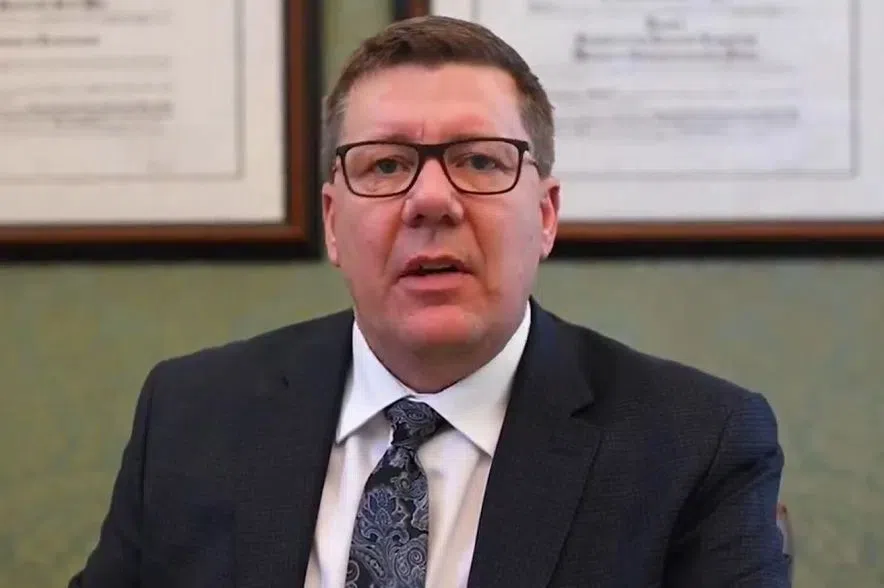Prime Minister Justin Trudeau says conservative politicians across Canada, including premiers, are lying to Canadians about the carbon price.
Most premiers and the federal Conservatives are pushing the Liberals to at least cancel a scheduled increase of the carbon price on Monday of next week.
Political leaders who criticize the policy are failing to acknowledge and inform Canadians about those rebates, which are meant to offset costs to consumers, Trudeau said. Households that lower their fuel use save money, but their rebate amounts are unaffected.
“Conservative premiers across this country are misleading Canadians, are not telling the truth,” he said. “Eight out of 10 families across the country in federal backstop jurisdictions make more money with the Canada Carbon Rebate than it costs with the price on pollution.”
One of the conservative premiers Trudeau is referring to is Saskatchewan Premier Scott Moe, who laid out his case against the carbon tax during a virtual appearance before the Standing Committee on Government Operations and Estimates on Wednesday morning.
The meeting started with a fight over whether it was even the proper forum for carbon tax talk, but eventually Moe got to go ahead with his pitch, explaining why he wants the federal government to stop the increase, and why he’s against the tax entirely.
“This is an opportunity for all of us — those that are in the minority (federal) government that we have today and in opposition — to do what is in the best interest of Canadians, not just for today but into the future as well,” Moe said in his opening statement.
Moe parried with several of the committee members when they asked questions, at one point going back and forth with a member who was pointing out that Canada and Saskatchewan are behind on emissions targets. Moe came back arguing whether gross or per-capita numbers are correct, and at another point saying he doesn’t think either are “laggards.”
“I think Saskatchewan and Canada are leaders when it comes to developing industries that are reducing emissions with innovation, and then sharing those around the world,” he said.
Moe agreed that emissions need to be reduced and, when asked what Saskatchewan was going to do to make large emitters pay more, Moe replied: “The goal is not for our employers to pay more, the goal is for them to emit less and displace higher emitting, like competing industries around the world.”
“How is it we shouldn’t make big polluters pay?” NDP MP Alexandre Boulerice demanded in that exchange, accusing Moe of believing that “giant vacuum cleaners” will suck emissions out of the sky to solve climate change.
The antagonistic nature of the debate was on full display at the committee, which spent almost as much time arguing about whether Moe should have been there at all as it did hearing what he had to say.
Liberal, NDP and Bloc Québécois MPs accused the Conservatives, who chair the committee, of circumventing other members and inviting Moe to speak without any consultation.
MPs from the three parties, which all endorse carbon pricing, pushed Moe to explain what he would do to cut emissions.
Trudeau wrote a letter to premiers Tuesday suggesting that if they dislike the federal carbon pricing policy so much, they are welcome to produce their own systems to achieve the same results.
Moe said Saskatchewan’s industry and farmers have lowered their emissions and are displacing products overseas that have a higher carbon footprint.
He insisted the carbon price makes it harder for families and businesses to lower their emissions.
Ontario Liberal MP Francis Drouin challenged Moe on why he hasn’t cut taxes he is in control of if he is so concerned about the cost of living.
Saskatchewan already exempts natural gas used for heat from the provincial sales tax.
In January, Moe also stopped the province’s collection of the carbon tax on natural gas used for heat, in retaliation for the federal decision to temporarily exempt heating oil from the policy.
About 80 per cent of Saskatchewan households use natural gas for heat, compared with just three per cent that use heating oil.
Liberal MP Charles Sousa pushed Moe a little on that decision, asking him if he expects Saskatchewan residents to uphold the law.
Moe said he does, but he also said the decision on carbon pricing and natural gas was made because Ottawa is being unfair.
The NDP in Saskatchewan
As Moe spoke to the committee, Saskatchewan NDP Leader Carla Beck suggested Moe could give relief to Saskatchewan families right away.
On The Evan Bray Show with guest host Tamara Cherry, Beck said the provincial government can put a pause on its current gas tax, which could help give Saskatchewan families immediate relief now.
“The No. 1 issue we hear from Saskatchewan people is the cost of living,” Beck said. “This is something that the premier could do today and could’ve done at any point out of session and cut the PST on gas and diesel and people would immediately see a 15-cent reduction at the pumps.”
Beck wondered why Saskatchewan hadn’t followed the lead of provinces like Alberta and Ontario, which both put a pause on their gas taxes over the last two years to help people deal with the rising cost of living.
“This is something over half of the Canadian population has had benefit from. It’s something for whatever reason we haven’t seen this premier do and again they just delivered a budget without one additional dime of tax relief for Saskatchewan people,” Beck added.
Beck feels Moe and his government need to do something to provide relief to Saskatchewan people.
“I would say to the premier, ‘If not the gas tax, then what is your plan to provide some relief?’ Because we haven’t seen any of it from this government,” Beck said.
— With files from The Canadian Press











